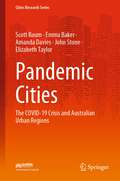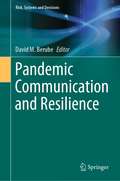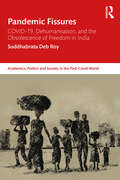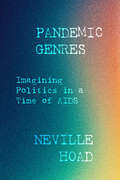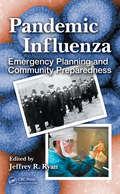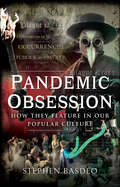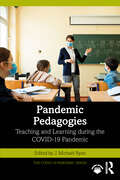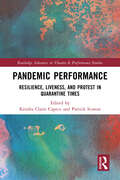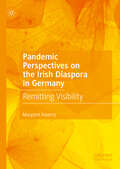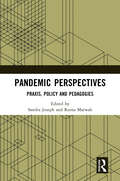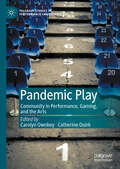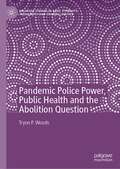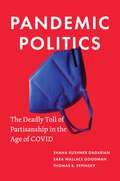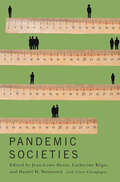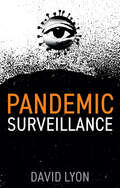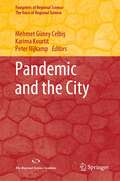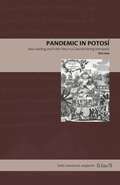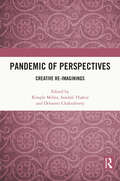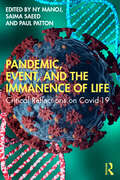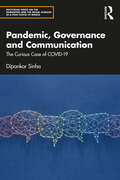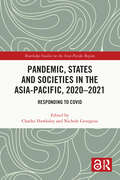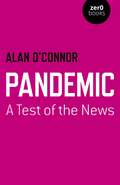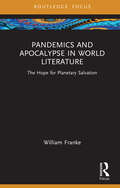- Table View
- List View
Pancakes to Parathas: Breakfast Around the World
by Alice B. McGintyA Northern Lights Book Award Winner!Sakura Medal 2021 Nominee!Breakfast varies from country to country, but it's how all children begin their day. Explore the meals of twelve countries in this playful approach to the world!From Australia to India to the USA, come travel around the world at dawn. Children everywhere are waking up to breakfast. In Japan, students eat soured soybeans called natto. In Brazil, even kids drink coffee--with lots of milk! With rhythm and rhymes and bold, graphic art, Pancakes to Parathas invites young readers to explore the world through the most important meal of the day.
Pandemic Cities: The COVID-19 Crisis and Australian Urban Regions (Cities Research Series)
by Elizabeth Taylor John Stone Emma Baker Amanda Davies Scott BaumThis book highlights the impact of the COVID-19 pandemic on cities. The COVID-19 pandemic and the associated economic and social impacts have been felt around the world. In large cities and other urban areas, the pandemic has highlighted a number of issues from pressures on urban labour and housing markets, shifts in demographic processes including migration and mobility, changes in urban travel patterns and pressures on contemporary planning and governance processes. Despite Australia’s relatively mild COVID exposure, Australian cities and large urban areas have not been immune to these issues. The economic shutdown of the country in the early stages of the pandemic, the sporadic border closures between states, the effective closure of international borders and the imposition of widespread public health orders that have required significant behavioural change across the population have all changed our cities in some and the way we live and work in them in some way. Some of the challenges have reflected long-standing problems including intrenched inequality in labour markets and housing markets, others such as the impact on commuting patterns and patterns of migration have emerged largely during the pandemic. This book, co-authored by experts in their field, outlines some of the major issues facing Australian cities and urban areas as a result of the pandemic and sets a course for future of the cities we live in.
Pandemic Communication and Resilience (Risk, Systems and Decisions)
by David M. BerubeThis book examines how we design and deliver health communication messages relating to outbreaks, epidemics, and pandemics. We have experienced major changes to how the public receives and searches for information about health crises over the last twelve decades with the ongoing shift from text/broadcast-based to digital messaging and social media. Both health theories and practices are examined as it applies to testing, tracking, hoarding, therapeutics, and vaccines with case studies. Challenges to communicate about health to diverse audiences (including the science illiterate) and across (both Western and developing economies) have been complicated by politics, norms and mores, personal heuristics, and biases, such as mortality salience, news avoidance, and quarantine fatigue. Issues of economic development and land use, trade and transportation, and even climate change have increased the exposure of human populations to infectious diseases making risk and resilience more pressing. The book has been designed to support health communicators and public health management professionals, students, and interested stakeholders and university libraries.
Pandemic Fissures: COVID-19, Dehumanisation, and the Obsolescence of Freedom in India (Academics, Politics and Society in the Post-Covid World)
by Suddhabrata Deb RoyThis book analyses India’s response to COVID-19, using an intersectional framework that highlights the roles of the central government, regional governments, and community organisations, both formal and informal. The volume brings forward the immense potential embedded within collective communitarian formations by exploring themes such as disaster capitalism, municipal socialism, civic capitalism, apocalypse or disaster communism, and Marxist humanism in relation to the management strategies exhibited by the Indian government towards the COVID-19 pandemic. It underscores the necessity for imagining a scenario where egalitarian and socially just policies replace the dominance of capitalism.Part of the Academics, Politics and Society in the Post-COVID World series, the book will be an essential read for scholars and researchers of sociology, political studies, cultural studies, social anthropology, South Asia studies, pandemic studies, and postcolonial studies.
Pandemic Genres: Imagining Politics in a Time of AIDS
by Neville Wallace HoadA free ebook version of this title is available through Luminos, University of California Press's Open Access publishing program. Visit www.luminosoa.org to learn more. As HIV/AIDS emerged as a public health crisis of significant proportions across sub-Saharan Africa, it became the subject of local and international interest that was at once prurient, benevolent, and interventionist. Meanwhile, the experience of Africans living with HIV/AIDS became an object of aesthetic representation in multiple genres produced by Africans themselves. These cultural representations engaged public discourse—the public policy pronouncements of officials of postcolonial states, an emerging global NGO-speak, and journalism. In Pandemic Genres, Neville Hoad investigates how cultural production—novels, poems, films—around the pandemic supplemented public discourse. He shows that the long historical imaginaries of race, empire, and sex in Botswana, Kenya, and South Africa underwrote all attempts to bring the pandemic into public representation. Attention to genres that stage themselves as imaginary, particularly on the terrain of feeling, may forecast possibilities for new figurations.
Pandemic Influenza: Emergency Planning and Community Preparedness
by Jeffrey R. RyanThe swine flu emergency needn‘t become a crisis. This critically acclaimed work provides public health officials, doctors, responders, and emergency planners with accurate current information that will help them understand the nature of an outbreak, assess risk, answer public concerns, and develop informed strategies. Devoid of sensationalism and a
Pandemic Obsession: How They Feature in our Popular Culture
by Stephen Basdeo“Pestilence entered… The ordinary pursuits of society were paralysed; all previously-formed plans of happiness, business, trade, occupation, and domestic arrangement, were checked as cruelly and abruptly as if every principle of the human mind were in a moment subverted… The physicians saw that human aid was vain, and that destruction inevitably awaited all who approached the infected. Terrific mortality! Appalling scourge of the human race!” — George W.M. Reynolds Throughout history humankind has faced a number of deadly pandemics and such diseases have left their mark in history books, fine art, novels, life writing, and newspapers. This book collects together writings from across the centuries which illuminate people’s experiences with plagues and pandemics. From Ancient Greece there is Thucydides on the Athenian Plague; Procopius gives his account of Plague of Justinian; also included is many more extracts of writings on plagues from medieval and early modern writers. Readers can enjoy several works of fiction including an abridged version of Mary Shelley’s The Last Man (1826), a reproduction in full of Jack London’s Scarlet Plague (1912), as well as short pandemic stories from Edgar Allan Poe, George W.M. Reynolds, Daniel Defoe, and William Harrison Ainsworth.
Pandemic Pedagogies: Teaching and Learning during the COVID-19 Pandemic (The COVID-19 Pandemic Series)
by J. Michael RyanPandemic Pedagogies: Teaching and Learning during the COVID-19 Pandemic provides critical insights into the impact of the pandemic on the education system, pedagogical approaches, and educational inequalities. Education is often touted as the best way to promote social mobility and produce informed members of society. The pandemic has significantly threatened those goals by temporarily disrupting education and exacerbating disparities in the education system. The scholarship in this volume takes a closer look at many of the issues at the heart of the educational process including teacher self-efficacy, the gendered and racialized impacts of the pandemic on education, school closures, and institutional responses. Drawing on the expertise of scholars from around the world, the work presented here represents a remarkable diversity and quality of impassioned scholarship on the impact of COVID-19 and is a timely and critical advance in knowledge related to the pandemic.
Pandemic Performance: Resilience, Liveness, and Protest in Quarantine Times (Routledge Advances in Theatre & Performance Studies)
by Kendra Claire CapecePandemic Performance chronicles the many ways that people are surviving/thriving through performance in a global pandemic. Covering artists and events from across the United States: from New York to California and from South Dakota to Texas, the chapters are equal parts theory and practice, weaving scholarship with personal experience from contributors who are interdisciplinary artists, scholars, journalists, and community organizers providing unique and invaluable perspectives on the complicated work of resilience during COVID-19. This study will hold interest for students and scholars in the performing arts, arts, and social justice as well as professional artmakers and creative community organizers.
Pandemic Perspectives on the Irish Diaspora in Germany: Remitting Visibility
by Margaret HavertyThis book reflects on how the pandemic impacted upon qualitative social research, but also how it affected the lives of the members of the Irish diaspora on the European continent. The crisis acted as a pressure cooker for those ‘living abroad,’ transforming distance and migration situations to resemble times gone by, when travel was far more prohibitive and emigration felt more permanent. At the same time, ‘expat lives’ were being thrown headlong into a new future, shaped more profoundly than ever by digital means. This work is a close examination of how Irish migrants in Germany construct their Irishness and, in doing so, maintain their belonging to Ireland across a geographic distance transformed by the pandemic. This work seeks to draw out the underlying patterns and meanings in the day-to-day practices of Irishness by members of Ireland’s putative diaspora in Germany by interweaving a multitude of ethnographic vignettes and rich interview material with relevant and interestingtheoretical concepts. Interlocutors see Ireland as a site of personal memory – good, bad and in-between – and of meaning-making practices. Ireland is deeply personal to them; that understood, their practices of belonging to Ireland are nonetheless embroiled in the political goal of making Ireland visible abroad.
Pandemic Perspectives: Praxis, Policy and Pedagogies
by Reena Marwah Sandra JosephThe book explores the impacts of the COVID-19 pandemic on nations across the globe since early 2020. It hosts a variety of perspectives within economic, social and development research studies, providing contemporary and proper information. The book also presents policy prescriptions for developing economies, critiques the system of disease surveillance and waste management, and defines a vision for India's development. It also mirrors issues related to digitisation, marginalisation, government regulations and health systems and provides original ideas for innovative methodologies suitable for higher education.Print edition not for sale in South Asia (India, Sri Lanka, Nepal, Bangladesh, Pakistan and Bhutan)
Pandemic Play: Community in Performance, Gaming, and the Arts (Palgrave Studies in Performance and Technology)
by Carolyn Ownbey Catherine QuirkWhen the arts, culture, and entertainment industries came to a halt in late winter 2020, many claimed this was the end of art as we knew it. Theatre managers, museum directors, performers, artists, and everyday folks had to figure out new strategies for living and thriving in a new world order. As the global pandemic and its consequences continue to play out, the question of how we have learned—as creators or consumers—to play, is far from settled. This collection addresses pandemic play in broad terms: how did creative industries adapt to a majority virtual world? How have our understandings of community and play evolved? Might new forms of art and play outlive the pandemic and supplant earlier iterations? Pandemic Play takes these questions as a starting point, exploring strategies, case studies, and effects of the arts worlds gone virtual.
Pandemic Police Power, Public Health and the Abolition Question (Palgrave Studies in Race, Ethnicity, Indigeneity and Criminal Justice)
by Tryon P. WoodsThis book critically explores how police power manifested beyond criminal law into the field of public health during the pandemic. Whilst people were engaged with anti-police violence protests, particularly in the US, they were being policed openly and notoriously by the government and medical science in the public health arena. The book explores how public health policing might be an abuse of constitutional power and encourages the abolition question to be applied consistently to the state’s discourse in the area of public health, as black people the world over continue to bear a disproportionate cost burden for public health policies. The chapters explore contemporary policing in terms of the historical context of slavery, the growth of the police and prison abolition movement and how this should be applied more widely, and how police power operates throughout society beyond the criminal justice system, in finance, technology, housing, education, and in medicine and health science. It seeks to re-examine our relationship to health sovereignty and the police power more fundamentally. It provides insights into the convergence of policing and social control of humans and argues that the most normative response is abolition.
Pandemic Politics: The Deadly Toll of Partisanship in the Age of COVID
by Thomas B. Pepinsky Sara Wallace Goodman Shana Kushner GadarianHow the politicization of the pandemic endangers our lives—and our democracyCOVID-19 has killed more people than any war or public health crisis in American history, but the scale and grim human toll of the pandemic were not inevitable. Pandemic Politics examines how Donald Trump politicized COVID-19, shedding new light on how his administration tied the pandemic to the president’s political fate in an election year and chose partisanship over public health, with disastrous consequences for all of us.Health is not an inherently polarizing issue, but the Trump administration’s partisan response to COVID-19 led ordinary citizens to prioritize what was good for their “team” rather than what was good for their country. Democrats, in turn, viewed the crisis as evidence of Trump’s indifference to public well-being. At a time when solidarity and bipartisan unity were sorely needed, Americans came to see the pandemic in partisan terms, adopting behaviors and attitudes that continue to divide us today. This book draws on a wealth of new data on public opinion to show how pandemic politics has touched all aspects of our lives—from the economy to race and immigration—and puts America’s COVID-19 response in global perspective.An in-depth account of a uniquely American tragedy, Pandemic Politics reveals how the politicization of the COVID-19 pandemic has profound and troubling implications for public health and the future of democracy itself.
Pandemic Societies
by Jean-Louis Denis, Catherine Régis, and Daniel WeinstockAt the outset of the COVID-19 pandemic, many thought the changes taking place would be fleeting. It is now widely recognized that COVID-19 will not be the last pandemic in our highly interconnected world, and “pandemic societies” will be with us for some time.Pandemic Societies brings together experts in a wide range of academic disciplines to reflect on how their fields might be transformed in this new context. While the pandemic forces global institutions, such as the World Health Organization, to reimagine the ways in which they function, it also reaches into our everyday lives to change how we organize culture, performing arts, sports, tourism, and cities. Exploring how COVID-19 has altered people’s daily experiences – the ways they meet to play, to perform, and to entertain themselves – this book also pulls the lens back to take in the broader institutional and political contexts in which these quotidian activities are carried out.Examining the profound ways in which the COVID-19 pandemic has transformed every aspect of our lives, Pandemic Societies attempts to understand how we might act to steer this pandemic society, and how to reinvent institutions and practices that we think of as intrinsically face to face.
Pandemic Surveillance
by David LyonThe COVID-19 pandemic has disrupted life as we knew it. Lockdowns, self-isolation and quarantine have become a normal part of everyday life. Pandemic surveillance allows governments and corporations to monitor and surveil the spread of the virus and to make sure citizens follow the measures they put in place. This is evident in the massive, unprecedented mobilization of public health data to contain and combat the virus, and the ballooning of surveillance technologies such as contact-tracing apps, facial recognition, and population tracking. This can also be seen as a pandemic of surveillance. In this timely book, David Lyon tracks the development of these methods, examining different forms of pandemic surveillance, in health-related and other areas, from countries around the world. He explores their benefits and disadvantages, their legal status, and how they relate to privacy protection, an ethics of care, and data justice. Questioning whether this new culture of surveillance will become a permanent feature of post-pandemic societies and the long-term negative effects this might have on social inequalities and human freedoms, Pandemic Surveillance highlights the magnitude of COVID-19-related surveillance expansion. The book also underscores the urgent need for new policies relating to surveillance and data justice in the twenty-first century.
Pandemic and the City (Footprints of Regional Science)
by Peter Nijkamp Karima Kourtit Mehmet Güney CelbişThis book features a collection of novel and original contributions to the study of urban sustainability from a human health perspective in the light of the current corona pandemic and the challenge of cities to offer inclusive, appealing, and healthy infrastructures. Written by experts from various disciplines, this book analyzes the impact of the corona pandemic on contemporary cities, and how these cities respond to the challenges. Featuring also case studies on various cities and regions, it addresses four interconnected research challenges and themes: Cities, cooperation, and resilience in the face of COVID-19Comparative approaches on patterns and effects of city and location-specific policies and socioeconomic structures during COVID-19The socioeconomic and labor market effects of pandemics on cities and local economiesThe need for new types of data and applications in addressing challenges in analysing the effects of COVID-19 on citiesThis book will appeal to scholars of regional and spatial science, urban economics, and urban planning and anyone interested in the impact of corona pandemic on city life.
Pandemic in Potosí: Fear, Loathing, and Public Piety in a Colonial Mining Metropolis (Latin American Originals #18)
by Kris LaneIn 1719, a deadly and highly contagious disease took hold of the Imperial Villa of Potosí, a silver mining metropolis in what is now Bolivia. Within a year, the pathogen had killed some 22,000 people, just over a third of the city’s residents. Victims collapsed with fever, body aches, and effusions of blood from the nose and mouth. Most died within days. The great Andean pandemic of 1717–22 was likely the most destructive disease to strike South America since the days of the Spanish conquest.Pandemic in Potosí features the single longest narrative of this nearly forgotten period, penned by local historian Bartolomé Arzáns de Orsúa y Vela, along with shorter treatments of the disease’s ravages in Cuzco, Arequipa, and the outskirts of Lima. The "Gran Peste," as it was called, was a pivotal event about which Arzáns wrote at length because he lived through it, but also because it was believed to have cosmic significance. Kris Lane translates and contextualizes Arzáns’s account, which is rich in local detail that sheds light on a range of topics—from therapeutics, devotional life, class relations, gender, and race to conceptions of illness, sin, and human will and responsibility during a major public health crisis.Original narratives of the pandemic, translated here for the first time, help readers see commonalities and differences between past and present disease encounters. Designed for use in courses on Latin American history, this concise work will also interest scholars and students of the history of religion, history of medicine, urban studies, and epidemiology.
Pandemic in Potosí: Fear, Loathing, and Public Piety in a Colonial Mining Metropolis (Latin American Originals)
by Kris LaneIn 1719, a deadly and highly contagious disease took hold of the Imperial Villa of Potosí, a silver mining metropolis in what is now Bolivia. Within a year, the pathogen had killed some 22,000 people, just over a third of the city’s residents. Victims collapsed with fever, body aches, and effusions of blood from the nose and mouth. Most died within days. The great Andean pandemic of 1717–22 was likely the most destructive disease to strike South America since the days of the Spanish conquest.Pandemic in Potosí features the single longest narrative of this nearly forgotten period, penned by local historian Bartolomé Arzáns de Orsúa y Vela, along with shorter treatments of the disease’s ravages in Cuzco, Arequipa, and the outskirts of Lima. The “Gran Peste,” as it was called, was a pivotal event about which Arzáns wrote at length because he lived through it, but also because it was believed to have cosmic significance. Kris Lane translates and contextualizes Arzáns’s account, which is rich in local detail that sheds light on a range of topics—from therapeutics, devotional life, class relations, gender, and race to conceptions of illness, sin, and human will and responsibility during a major public health crisis.Original narratives of the pandemic, translated here for the first time, help readers see commonalities and differences between past and present disease encounters. Designed for use in courses on Latin American history, this concise work will also interest scholars and students of the history of religion, history of medicine, urban studies, and epidemiology.
Pandemic of Perspectives: Creative Re-imaginings
by Rimple Mehta Debaroti Chakraborty Sandali ThakurThis volume brings together academics, activists, social work practitioners, poets, and artists from different parts of the world during the Covid-19 pandemic. It sheds light on how the pandemic has exposed the inequities in society and is shaping social institutions, affecting human relationships, and creating new norms with each passing day. It examines how people from diverse societies and fields of work have come to conceptualise and imagine a new world order based on the principles of social and ecological justice, care, and human dignity. It prioritises the realm of imagination, creativity, and affect in understanding social formations and in shaping societies beyond the positivist approaches. Documenting the myriad experiences and responses to the pandemic, the volume foregrounds varied processes of making meaning; understanding impulses, resistances, and coping mechanisms; and building solidarities. Further, it also acts as a tool of memory for future generations, and articulations- artistic, political, socio-cultural, scientific- of hope and perseverance. This spectrum of expressions intends to value visceral experiences, build solidarities, and find solace in art. Its uniqueness lies in the way it brings together a much-needed interface between science, social sciences, and humanities. A compelling account on our contemporary lives, the volume will be of great interest to scholars of sociology and social anthropology, politics, art and aesthetics, psychology, social work, literature, health, and medical sciences.
Pandemic, Event, and the Immanence of Life: Critical Reflections on Covid-19
by Paul Patton Saima Saeed Ny ManojThis volume reflects on different regional and national experiences of the Covid 19 pandemic, with contributions from India, Thailand, Singapore, Australia, Italy, United States, and Canada.This book draws upon a number of approaches but especially the works of Deleuze and Guattari, Agamben, Derrida, Foucault, Habermas, Latour, and Serres. It looks at the methodological aspects of treating the pandemic, focuses on laying out the posthuman condition of the event largely problematizing the immanence of life which affirms the transversal Deleuzian ethic of life, and extends the politics of life to the domain of immunology. Together, the authors make it apparent that the pandemic is a multifaceted event, or many different kinds of events – virological, informational, phenomenological, social, and discursive. The authors skilfully develop these different dimensions of the pandemic event and show the relations between them. These essays will enrich the reader’s understanding of the pandemic and its effects, while demonstrating the depth and breadth of the resources that humanities scholarship can mobilize to help us understand such phenomena.This volume will be useful to students of posthumanism, medical humanities, health communication, political communication, semiotics, literature, cultural theories, and major strains of thought from contemporary continental philosophy.
Pandemic, Governance and Communication: The Curious Case of COVID-19 (Routledge Series on the Humanities and the Social Sciences in a Post-COVID-19 World)
by Dipankar SinhaThis book focuses on what is arguably the most devastating phenomenon in the history of modern civilization, the COVID-19 pandemic. It shows how, on the one hand, the pandemic has exposed governments the world over to deal with a major health crisis; and, on the other, efforts by the ruling forces to enforce surveillance on people and disciplining them by maneuvering cutting-edge digital technology in the name of security and safety. Second, it explores how the mainstream versions of crisis communication and risk communication face huge challenges during a pandemic. Finally, it analyses how the pandemic propels an extraordinary expansion of infodemic — rapid spread of excessive quantities of misinformation and disinformation of the fake and false variety — and how social media in particular becomes its main tool in causing subversion of the prevalent information order. Engaging, comprehensive and accessible, this book will be of immense importance to scholars and researchers of politics, especially governance and political communication, communication studies, and public health management. It will be vital for public policy professionals, experts in thinktanks, career bureaucrats, and non-governmental organizations.
Pandemic, States and Societies in the Asia-Pacific, 2020–2021: Responding to COVID (Routledge Studies on the Asia-Pacific Region)
by Nichole Georgeou Charles HawksleyHawksley and Georgeou bring together scholars and practitioners from across the region to analyse the main effects of the first two years of the COVID pandemic in a range of case studies from Southeast Asia, East Asia, South Asia, and Oceania.The book provides a broad survey of how Indonesia, Bangladesh, Japan, the Philippines, Vietnam, Nepal, Australia, Cambodia, Taiwan, and New Zealand attempted to manage the COVID pandemic; the challenges they faced; and how they fared. Drawing on insights from politics, economics, sociology, law, public health, education, and geography, most authors are nationals of the cases they discuss. Written in non-specialist language, ten case studies are examined, providing a useful analysis of the first two years of COVID in the Asia-Pacific from the emergence of COVID in January 2020 to the lifting of restrictions in December 2021. Chapters focus on different issues according to the scholar’s academic expertise, and a wide diversity of national pandemic experiences, challenges, and responses are showcased.An essential read for scholars and students interested in the areas of Asia-Pacific politics, sociology, and public health.Chapter 8 of this book is freely available as a downloadable Open Access PDF at http://www.taylorfrancis.com under a Creative Commons Attribution-Non Commercial-No Derivatives (CC BY-NC-ND) 4.0 license.
Pandemic: A Test of the News
by Alan O'ConnorThis book argues against the rapidly expanding literature about misinformation during the Covid-19 pandemic - and that the real issues are much broader. Mainstream news media, except Fox News, has generally done a good job in educating people about the basic facts and precautions to be taken. Pandemic: A Test of the News identifies the mainframes used to tell the media story. With some exceptions such as long reads in The New Yorker and the Guardian, the media has not included the fundamental factors that caused the pandemic, the seriousness of a medical crisis that will last for several years - and the same factors that will cause the next pandemic.
Pandemics and Apocalypse in World Literature: The Hope for Planetary Salvation (Routledge Focus on Literature)
by William FrankePandemics and Apocalypse rereads classical narratives of plague from the Bible (Exodus) and classical antiquity, both Greek (Homer, Thucydides, Sophocles) and Roman (Lucretius, Virgil, Ovid), through the Middle Ages (Dante, Boccaccio) and Modernity (Defoe, Manzoni, Artaud, Camus) as a basis for contemplating the significance of the recent Covid-19 pandemic. It concerns how we are to confront future pandemics and other inextricably related crises, notably those of an ecological nature. Responses to Covid-19 typically set everything on defeating this “enemy,” but actually we cannot eliminate viruses without eliminating ourselves. We need to see the pandemic as revealing us to ourselves in our inherently vulnerable condition as a first step to admitting the infinite openness to one another and to our Ground—physical and metaphysical—that alone can save our world by engendering a different attitude, open and engaged, to one another and to the Earth as sources of our collective life.

